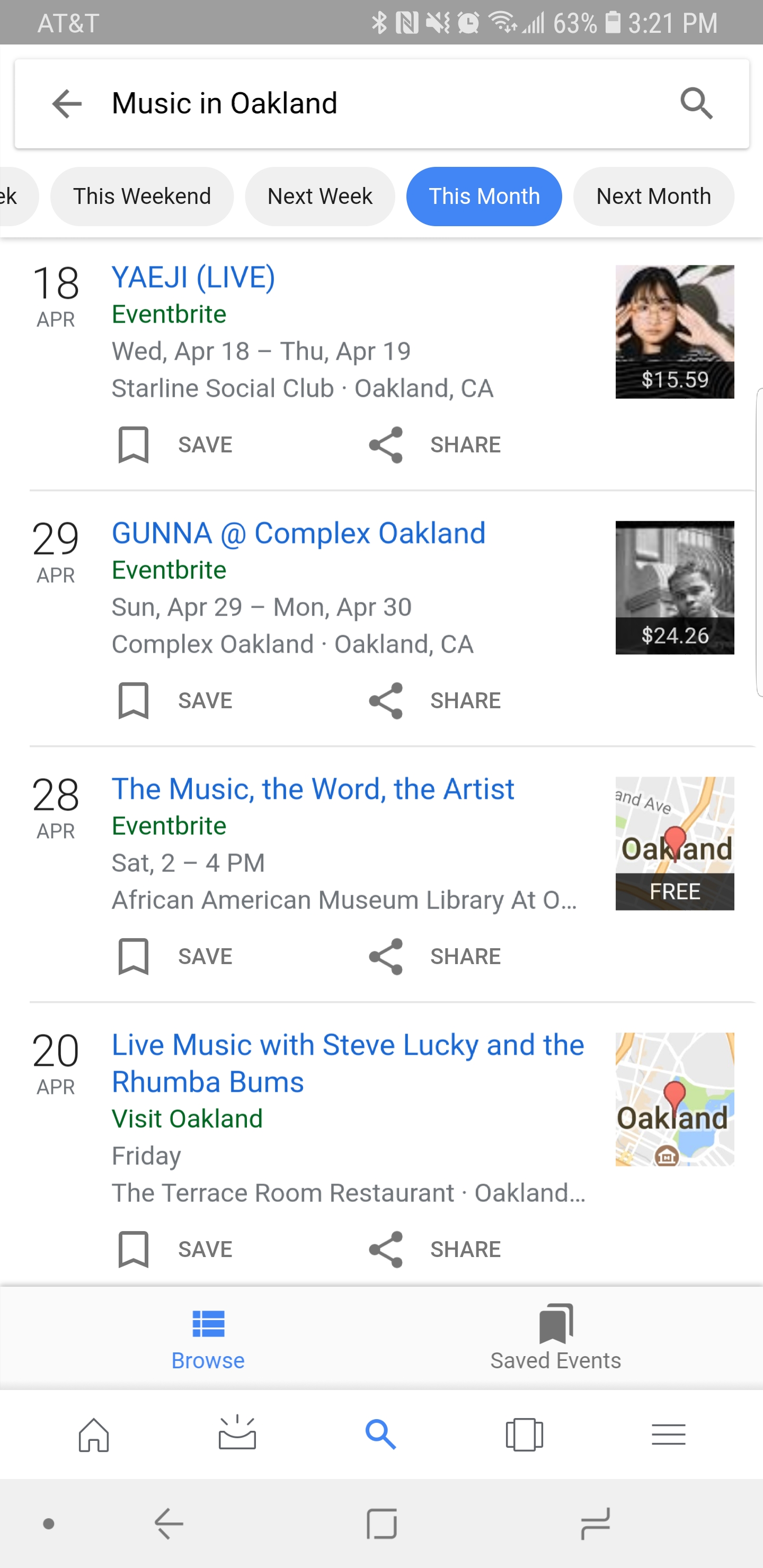Eventbrite เพิ่มการเข้าชมได้ 100% ด้วยประสบการณ์การค้นหากิจกรรมใน Google
เผยแพร่เมื่อวันที่ 8 พฤษภาคม 2018
ความท้าทาย
Eventbrite เป็นแพลตฟอร์มเทคโนโลยีกิจกรรมที่ใหญ่ที่สุดในโลกซึ่งประชาสัมพันธ์กิจกรรมหลายล้านรายการในประเทศและเขตแดนต่างๆ กว่า 180 แห่ง ทีมปรับแต่งเว็บไซต์ให้ติดอันดับบนเครื่องมือการค้นหา (SEO) ของบริษัทเริ่มใช้ Structured Data Event ในเว็บไซต์เมื่อปี 2015 เพื่อเพิ่มระดับการเข้าถึงทางออนไลน์และเพื่อให้ผู้ใช้ค้นพบกิจกรรมของผู้จัดงานได้ง่ายขึ้น การดำเนินการนี้ช่วยให้บริษัทพร้อมเข้าร่วมในประสบการณ์การค้นหากิจกรรมในอุปกรณ์เคลื่อนที่แบบใหม่ที่ Google เปิดตัวไปเมื่อเดือนพฤษภาคมปี 2017 "เราได้เห็นผลลัพธ์ที่ยอดเยี่ยมจากการทำ SEO" Allen Jilo ผู้จัดการผลิตภัณฑ์ของ Eventbrite กล่าว "ช่วงที่ Google เริ่มใช้ประโยชน์จากมาร์กอัป schema.org สำหรับกิจกรรม เราสังเกตเห็นว่ากิจกรรมต่างๆ ปรากฏในผลการค้นหาในลักษณะที่ต่างไปจากเดิม และสนใจที่จะทำงานกับ Google อย่างใกล้ชิดมากขึ้นในการขยายโอกาสดังกล่าว"
โซลูชัน

ประสบการณ์การค้นหาแบบใหม่ซึ่งใช้ประโยชน์จาก Structured Data Event ช่วยให้ผู้ใช้ค้นหากิจกรรมต่างๆ ผ่าน Google Search และผลิตภัณฑ์อื่นๆ อย่าง Google Maps ได้ นอกจากนี้ ผลการค้นหาที่สมบูรณ์ขึ้นมักจะมีฟีเจอร์อินเทอร์แอกทีฟขั้นสูงที่ช่วยให้ผู้ใช้ดำเนินการบางอย่าง (เช่น ดูรายละเอียดกิจกรรม) ขณะที่ยังอยู่ใน Search ได้ด้วย ตัวอย่างเช่น หากผู้ใช้ค้นหา "คอนเสิร์ตที่ภูเก็ต" ประสบการณ์การค้นพบกิจกรรมแบบพิเศษจะปรากฏขึ้นในพื้นที่ที่การค้นหากิจกรรมที่สมบูรณ์ขึ้นมีให้ใช้งาน
ทีม SEO ของ Eventbrite นำ Structured Data Event ไปใช้ในเว็บไซต์ของตัวเองมากขึ้น โดยทำตามเอกสารประกอบสำหรับกิจกรรมของ Google เมื่อใช้เทมเพลตฐาน "การนำไปใช้งานจริงนั้นใช้เวลาไม่นานเลย" Jilo กล่าว ทีมปรับเปลี่ยน Structured Data เพียงเล็กน้อยหลังจากนั้น และพบว่าการปรับประสบการณ์การค้นหากิจกรรมทำได้ไม่ยากเลย ปัจจุบันกิจกรรมทั้งหมดที่เผยแพร่ใน Eventbrite มีมาร์กอัป Structured Data และผู้บริโภคในสหรัฐฯ จะเห็นผลการค้นหาที่สมบูรณ์ขึ้น จึงทำให้เรียกดูและค้นพบกิจกรรมที่น่าสนใจได้ง่ายยิ่งขึ้น นอกจากนี้บริษัทยังใช้ Search Console และเครื่องมือทดสอบ Structured Data เพื่อกำจัดข้อผิดพลาดในข้อมูลมาร์กอัปด้วย
ทีมได้ทดสอบหน้ากิจกรรมหลายหน้าหลังจากที่เพิ่มพร็อพเพอร์ตี้ Structured Data ที่ Google แนะนำ "Structured Data ช่วยให้ Google แสดงวันที่และสถานที่จัดกิจกรรม รวมถึงรายละเอียดที่สำคัญอื่นๆ ได้ ทำให้ข้อมูลโดดเด่นกว่าผลการค้นหาอื่นๆ" Jilo กล่าว "ตอนแรกเราไม่แน่ใจว่าจะเห็นประโยชน์อะไรบ้าง"
ผลลัพธ์
หากมีโครงการ SEO ที่กำลังดำเนินอยู่หลายโครงการ การจะหาข้อสรุปว่าโครงการใดช่วยเพิ่มการเข้าชม, Conversion หรือยอดขาย อาจเป็นเรื่องยาก แต่ Eventbrite เชื่อว่าประสบการณ์การค้นหากิจกรรมของ Google นั้นมีประสิทธิภาพ Jilo เล่าผลลัพธ์ให้ฟังว่า "1 เดือนหลังจากที่เรานำประสบการณ์การค้นหาใหม่มาใช้ ข้อมูลของ Google Analytics แสดงให้เห็นว่าการเข้าชมหน้าข้อมูลกิจกรรมของเราจาก Google Search เพิ่มขึ้นประมาณ 100% เมื่อเทียบกับการเติบโตแบบปีต่อปีตามปกติ" ประสบการณ์การค้นหาที่สมบูรณ์ขึ้นนี้ "ช่วยเพิ่มการเข้าชมและยอดขายบัตรเข้างานได้จริงๆ"
100%
ข้อมูลใน Google Analytics แสดงให้เห็นว่าการเข้าชมหน้าข้อมูลกิจกรรมจาก Google Search เพิ่มขึ้นเมื่อเทียบกับการเติบโตแบบปีต่อปีตามปกติ
"ภายใน 2 หรือ 3 สัปดาห์ เราเริ่มเห็นว่าผลการค้นหากิจกรรมของเราใน Google มีลักษณะที่ต่างไปจากเดิม" Jilo กล่าว ประสบการณ์การค้นหาของ Google Search ช่วยดึงดูดให้ผู้ใช้มาที่หน้ากิจกรรมได้มากขึ้นจริงๆ และเมื่อผู้ใช้เหล่านั้นทำ Conversion ก็หมายความว่าผู้จัดกิจกรรมขายบัตรได้เพิ่มขึ้นด้วย"
Eventbrite ใช้ Structured Data Event ในหน้าการค้นพบหลักๆ และคาดว่าจะใช้ฟังก์ชันนี้กับหน้าการค้นพบใหม่ทุกประเภท "เราจะพิจารณาเพิ่ม Structured Data Event ในหน้าเหล่านั้นด้วยอย่างแน่นอน" Jilo กล่าว "ประสบการณ์การค้นหาของ Google สำหรับงานกิจกรรมต่างๆ เป็นขั้นตอนที่ให้ผลลัพธ์ที่น่าพอใจอย่างแท้จริง"
